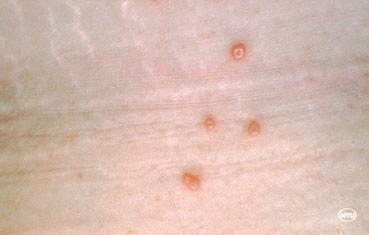Summer can be rough on skin, says Joshua Fox, MD, medical director of Advanced Dermatology P.C. Beyond the dangers associated with sunburn, a recent report in JAMA Dermatology found bikini waxes and shaving can increase the risk of contracting a contagious and unsightly skin rash known as molluscum contagiosum. In warm months, 61 percent of women remove hair from the bikini line at least once per week.
“Healthy skin acts as a barrier against infection,” explains Dr. Fox. “While waxing and shaving with a razor blade are normally considered safe procedures to remove body hair, they can cause deficits to the membrane barrier of the skin, allowing viruses or bacteria to enter the body more easily.” Molluscum contagiosum is a viral infection that causes small, fleshy-colored, raised bumps, often with a whitish center, to appear. It is spread through skin-to-skin contact or by touching a wet surface contaminated with the virus.
“It is one of the most common skin conditions we see in the summer,” Dr. Fox says. “Molluscum is a virus that loves warm, wet places and is spread easily.” He adds, “Until recently, molluscum was seen primarily in young children at swimming pools, where it earned the nickname ‘water warts,’ but it is on the rise among adult populations. Adults can also contract the virus through sexual contact.”
Molluscum is found worldwide, affecting 2 to 10 percent of children annually. It is common for the virus to spread among family members, with 35 percent of children having a positive family contact.
Tips to avoid molluscum contagiosum
According to Dr. Fox, good hygiene is the best way to avoid getting molluscum. Never pick or scratch bumps or rashes on the skin. In addition,
- Wash hands frequently
- Never share towels
- Avoid swimming, skin-to-skin or sexual contact immediately after waxing or shaving to allow skin to heal
- If waxing, use new or sterile equipment and do not re-use wax applicators during the treatment
- Avoid sharing boogie boards, surf boards and kick boards
- Clean or sanitize swim and athletic equipment before and after use
- Bathe thoroughly before and after swimming or other sports

Signs, symptoms and treatment
The rash usually appears on the torso, buttocks, lower belly or thighs about 7 weeks after exposure to the virus. In adults, the rash can also appear on the genitals and armpits.
Sometimes individual molluscum disappear in about 2-3 months, however, new growths tend to appear as old ones are going away. If not properly treated, advises Dr. Fox, “molluscum can spread and the virus can take years to resolve on its own. There are steps you and your doctor can take to stop it from spreading or causing discomfort or anxiety.”
- Keep areas with growths clean
- Cover with clean clothing or watertight bandages before participating in sports or contact with others
- Do not pick at lesions with fingernails
- Do not shave or do electrolysis over areas that have bumps
- Dress in loose cotton clothing to reduce irritation
- Moisturize dry skin with hypoallergenic moisturizers
Dermatologists use treatments to help the growths disappear more quickly, such as:
- Removal by freezing (cryotherapy) or scraping off with a sharp instrument (curettage)
- Applying a topical agent or cream to dissolve the growth such as blister beetle juice with Cantharidin, potassium hydricide, retinoic acid or Aldera.
Treatment works best when started early. Your doctor will discuss the advantages and disadvantages, (e.g. risk of bleeding), of treatment for you or your child. “Pools, sports and your normal beauty routines can sometimes leave you with more than you bargained for,” cautions Dr. Fox. “Failure to treat can lead to further infection and scarring. There is no point in suffering in silence when treatment is so readily available.”

